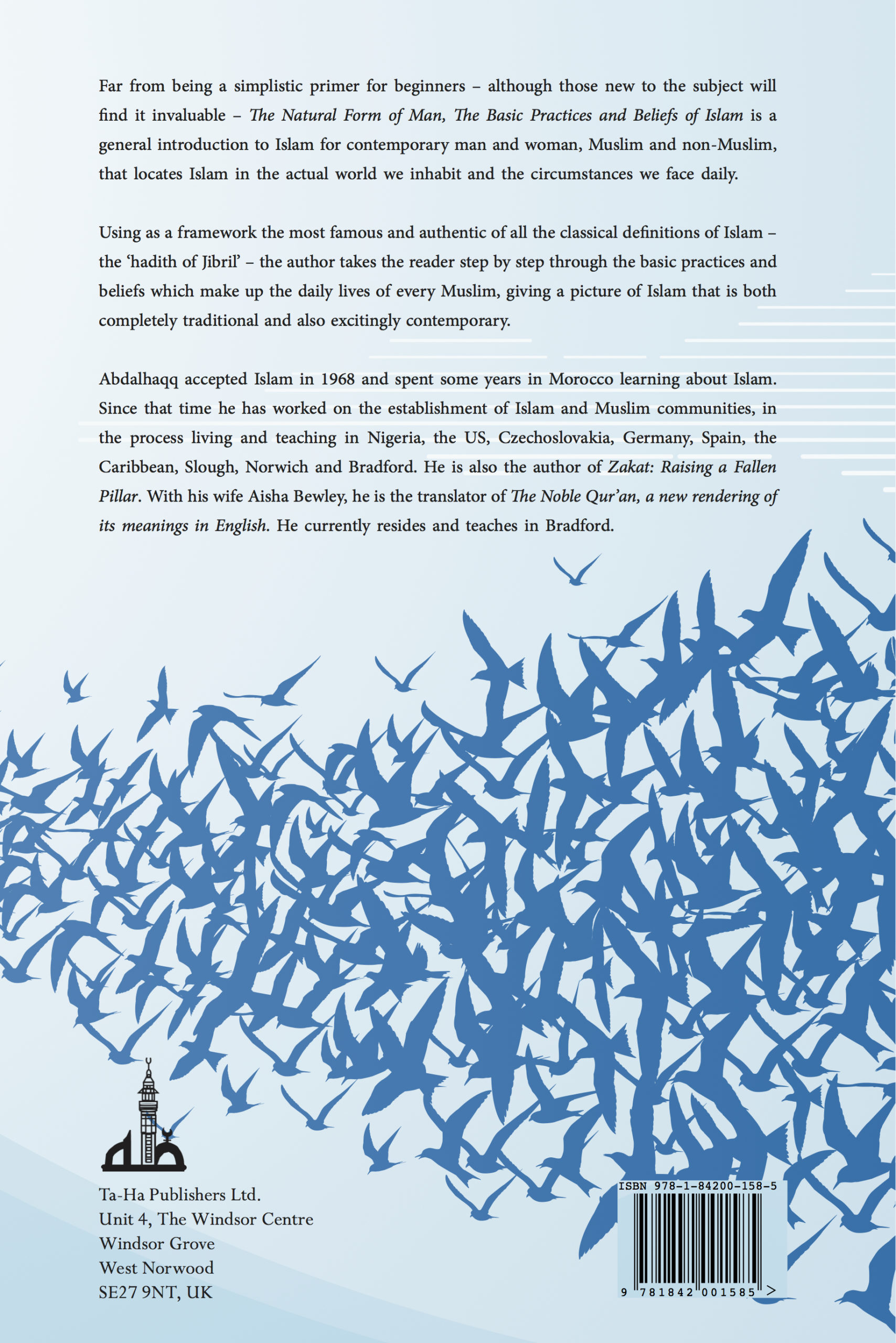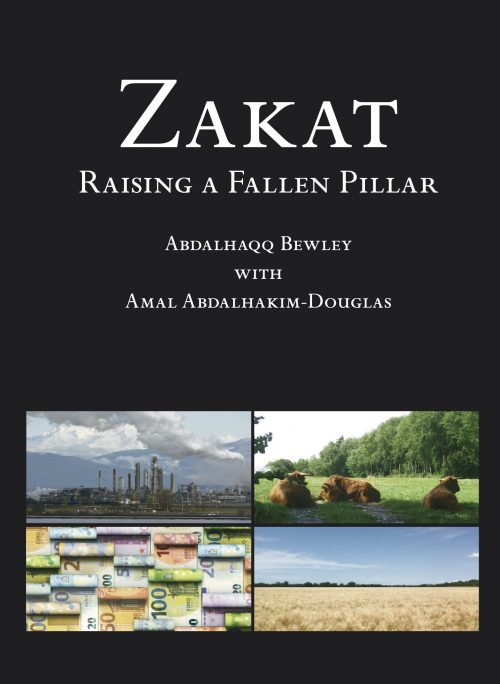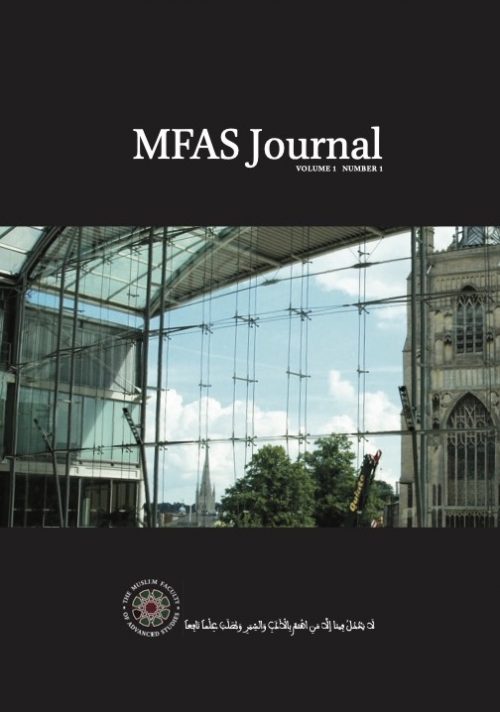Description
OUT OF STOCK
The Natural Form of Man – the Basic Practices and Beliefs of Islam is a general introduction to Islam for contemporary man and woman, Muslim and non-Muslim, that locates Islam in the actual world we inhabit today and the circumstances we face daily. It is the second edition of Islam – Its Basic Practices and Beliefs.
Using as a framework the most famous and authentic of all the classical definitions of Islam – the Jibril hadith – the author takes the reader step by step through the basic practices and beliefs which make up the daily lives of every Muslim, giving a picture of Islam that is both completely traditional and also excitingly contemporary.
15.6 x 23.4 cm. 246 pages
Shaykh Abdalhaqq Bewley
Shaykh Abdalhaqq accepted Islam in 1968 and spent some years in Morocco learning about Islam. Since that time he has worked on the establishment of Islam and Muslim communities, in the process living and teaching in Nigeria, the US, Czechoslovakia, Germany, Spain, the Caribbean, and the UK. He is the author of Zakat: Raising a Fallen Pillar. With his wife Aisha Bewley, he is the translator of The Noble Qur’an, a new rendering of its meanings in English. He currently resides and teaches in Bradford.
Download free sample
Book Review by Ahmad Thomson of the first edition: Islam, its Basic Practices and Beliefs
The Prophet Muhammad, may Allah bless him and grant him peace, said that an hour’s reflection is better than a lifetime of worship. This latest book of Hajj Abdalhaqq Bewley is the fruit of a lifetime’s reflection and a catalyst for a lifetime’s reflection. It is also very practical. It deals with actions and the meanings of these actions and the results of these actions, in this world and in the next. It is a reliable source of knowledge for those who rely on Allah, or who wish that they could rely on Allah. Above all, this book is illuminated by a knowledge which has been transmitted from living heart to living heart. Accordingly it is vast but not encyclopaedic. Since words tether meanings, it is also grounded in the understanding of well known reliable written sources of recorded knowledge which have been studied in depth. Accordingly it is the work of a scholar, but not of an academic. The Qur’an tells us that the people of knowledge are those who fear Allah (Qur’an: 35.28) ~ not those who accumulate information.
Since the author, together with his wife Hajja Aisha Bewley, has been deeply involved in the translations from Arabic into English of the Noble Qur’an, Al-Muwatta of Imam Malik and ash-Shifa of Qadi ’Iyad, as well as many other key Islamic texts, and since it is clear from the quotations he provides that he is well and widely read, it must have been difficult for him at times when writing this book to decide what to include and what to exclude ~ and yet this book is full of abundance and bereft of deficiency. Indeed whenever I thought that an important point had been omitted, I usually found it later on in the book. The author has so much knowledge to impart that it is presented in due measure so that it can be absorbed and retained.
The only limited criticism that I have is that the author does not say much about the intercession of the Prophet Muhammad on the Last Day, may Allah bless him and grant him peace ~ which will continue until not one person who said theshahada remains in the Fire, no matter how great the wrong action which took them there ~ but this is probably because the author is more concerned with emphasising the importance of our being scrupulous about intention and action in the first place, since it is each one of us who takes our self either to the Garden or to the Fire ~ and it is infinitely preferable to go straight to the Garden rather than via the Fire.
Shaykh Dr Abdalqadir as-Sufi once said, “Allah is so Merciful that I am almost tempted to say that you do not need to do the prayer ~ but you must do it!” In contrast, Hajj Abdalhaqq Bewley once said, “Probably more people obey Allah out of fear of the Fire than out of longing for the Garden. In contrast, Jesus, peace be on him, said that those who obey Allah purely out of love for Him are truly the nearest to God.”
However much you know, you only know a little. However much you know, you will certainly find knowledge in this book of which you were not aware before you opened it. This is especially because this book is primarily concerned with meaning. Accordingly it is an invaluable resource not only for the newcomer to Islam, but also for those who have been following the way of Islam as best they can for most or part of their lives and yet who know in their heart of hearts that they have not fully understood the significance of what they have been doing. As T.S. Eliot put it, “We had the experience but missed the meaning.”
As T. S. Eliot also wrote, “Where is the Life we have lost in living? Where is the wisdom we have lost in knowledge? Where is the knowledge we have lost in information?” This book contains all three of these elements of learning about Life.
What is especially significant about this book is that it does not simply describe the basic practices and beliefs of Islam in abstract, but rather in the context of today’s existential realities ~ as well as of Existence itself. The Prophet Muhammad, may Allah bless him and grant him peace, asked Allah to be able to see things as they are ~ and this is what this book is about.
In so doing, it articulates and evaluates the main modern thought constructs, philosophical concepts and ideological dogmas which many people on the face of the planet blindly accept as scientific gospel truth without ever having really reflected on or been capable of assessing them. In this aspect of the book there are echoes of the author’s earlier works, especially The Natural Form of Man,The Key to the Future and Zakat – Raising a Fallen Pillar. He reminds us that our greatest enemy is an ignorant self, but that it can be transformed by the grace of Allah to become a self at peace, pleased and well pleasing. Islam is the science of waking up.
In setting out the basic practices and beliefs of Islam by reference to both outward action and inward meaning, the author affirms clearly and eloquently the purpose of Islam and the reason for our existence ~ which is worship of the Divine Source of existence. He does this in such a way that the reader must inevitably arrive at a deeper understanding of both the Creator and the creation in both the Seen and Unseen worlds. As Shaykh Moulay Al-Arabi ad-Darqawi once wrote, Allah is only truly worshipped by means of knowledge: the deeper your knowledge, the more profound and illuminated your worship.
By holding firmly to this basic truth, the author avoids making the mistakes into which some religious groups (not only amongst the Muslims but more notably amongst their predecessors) inevitably fall: he does not tend towards worship of the Message ~ even though he has the great respect which is its due; nor does he tend towards worship of the Messenger ~ even though he is dearly beloved; the author simply reminds us that we have been created to worship the One Who sent the Messenger with the Message in order to guide us on the straight path.
In dealing with the nature of existence and of the One Who created it and all that it contains, the author inevitably deals with those aspects of the human situation with which people often grapple unsatisfactorily and with uncertainty, such as the nature of the Decree of Allah and how this contrasts with modern notions of free will and the freedom of choice, “when Allah created both you and what you do.” (Qur’an 37.96) As the author himself once observed, “Although I have to make choices, when I look back, I see that I could not have acted any differently!”
Perhaps one of the most reassuring aspects of the book is that while showing an understanding of such deviations as the khawarij/mutazili dialectic ~ which in its most recent form has manifested as the pseudo-salafi/modernist-reformer dialectic, the text is refreshingly free of such ‘too rigid/too floppy’ distortions of the original message. Hajj Abdalhaqq Bewley simply tells it how it is ~ and in so doing he confirms the role of traditional tasawwuf (sufism), which is to guard and establish the shari’a of Islam in order to arrive, by following the tariqa of Muhammad, may Allah bless him and grant him peace, at knowledge of thehaqiqa, in both this world and the next.
Hajj Abdalhaqq Bewley reminds us of the words of Imam Malik ibn Anas, may Allah be pleased with him: “Whoever has the shari’a without the haqiqa is astray. Whoever claims knowledge of the haqiqa without following the shari’a is a heretic. Whoever has both shari’a and haqiqa has realised.” He reminds us of the words of Imam Shafi’, may Allah be pleased with him: “Even if a man comes to you flying through the air, if he does not do the prayer ~ leave him!”
He reminds us of the words of Shaykh ibn Ajiba who states in his commentary on the poem of Ibn al-Banna of Saragossa, “The basis of sufism is in five things: Fear of Allah in secret and in the open. To follow the Sunnah in speech and deed. To turn away from creation whether it is coming towards you or leaving you. To be pleased with either a little or a lot. To return to Allah in ease and difficulty.”
If you read this book ~ and I recommend that you do ~ you will most probably react, to coin the author’s phrase, either like a moth or like a cockroach: you will either be attracted or repelled by its light ~ for real knowledge is light and this book is full of knowledge of the Real, “the Light of the heavens and the earth” (Qur’an 24.35). And if you are enlightened and inspired by this book, then it will act as a key to approaching the more detailed texts and seminal works to which the author refers.
Indeed if you do not already have a teacher, you may well start looking for one, for just as the Companions learnt from the Prophet, so the Followers learnt from the Companions ~ may the blessings and peace of Allah be for ever on him and on his family and on his companions and on his followers ~ and this is how every generation of Muslims has learnt from their predecessors, up until the present day. If it were not for the means, the end would escape us.
As Shaykh Dr Abdalqadir as-Sufi once said, “I can give you the key and show you the door ~ but you have to put the key in the lock, and turn the key, and open the door and pass through!” This is what this book will help you do.
If you are sufficiently awake to recognise that Islam is not what those who reject it or do not understand it say it is ~ and if you would genuinely like to understand what the way of Islam is and what its fruits and rewards are ~ then this book was written for you. If you sometimes feel like a golden fish confined in a transparent bowl, then perhaps this book will help provide you with the nourishment and sustenance that you need to enable you to make your way towards and discover the ocean in which in reality you are already swimming. As Shaykh Dr Abdalqadir as-Sufi recently remarked, “At last, a book about Islam that you can give to people!”
Hajj Ahmad Thomson April 2009/Rabi’al-Akhir 1430








Reviews
There are no reviews yet.